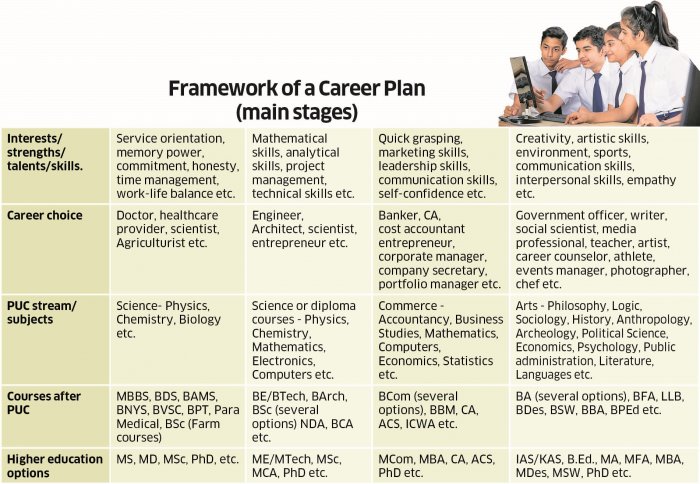The results of the SSLC examination were out last week and this is the time, students must make the most important decision of their life, choosing a career, which typically lasts for 35-40 years.

For a long-time, students are practicing a system of choosing a course first and then trying to settle down in a career. However, from interaction with students, many of them are confused about selecting a career, even after completing a postgraduation degree. Take, for instance, the case of Nirmal who after doing MTech was confused between options like an industry job, pursuing PhD or a government job through competitive exams. Then, there are examples of students completing a particular course and finding lack of demand from recruiters. Moreover, in Indian scenario, students are being pushed to predetermined STEM (Science, Technology, Engineering and Mathematics) courses, irrespective of their passion. Years ago, I was counselling at a prestigious college and Arun was a bright boy keen to make a career as a Chef. Despite my recommendation to his parents, to consider passion and allow him to become a Chef, Arun was forced into an engineering course. Deeply disappointed, Arun went into depression and failed in the first two semesters. Realizing that their decision was wrong, parents admitted Arun to a Chef course. Such situations can be avoided, if a career plan is made first and then choosing courses. Also, the practice of seeking science stream for high scoring students, and commerce or arts stream for others is not only unscientific but is detrimental to the long-term career prospects of the students.
How to make a career plan?
A career plan must be made, ideally after completing SSLC or an equivalent board exam, before deciding a stream in PUC course. While, the process of making a career plan, is explained in the accompanying table, the following are the important stages.
1. Self-evaluation
Ask probing questions to understand strengths, interests, passion and aptitude. You may also take an online aptitude test or consult a career counsellor.
2. Career choice
In line with your aptitude, choose a career with long-term prospects.
3. Family needs
Considering family challenges, values and needs, make a career plan with short-term and long-term objectives. Ensure goals are specific, measurable, achievable, realistic and time-bound (SMART goals).
4. Course choices
Based on career choice, decide the courses to be done up to post-graduation / doctorate level.
5. Acquire skills
To build a strong career, it’s necessary to build your personality and add career-related skills to enhance your potential. Do this periodically, to stay competitive in the employment market.
Due to globalization, technological advances and changing consumer preferences, career and course options have changed too. Jobs which are in demand today, didn’t exist a few years back, and some jobs of today will not exist tomorrow. Therefore, future jobs will be radically different, needing different knowledge and skill sets. To be successful in your personal life, a strong career is crucial. Therefore, plan your career, execute the plan and be the architect of your life.

